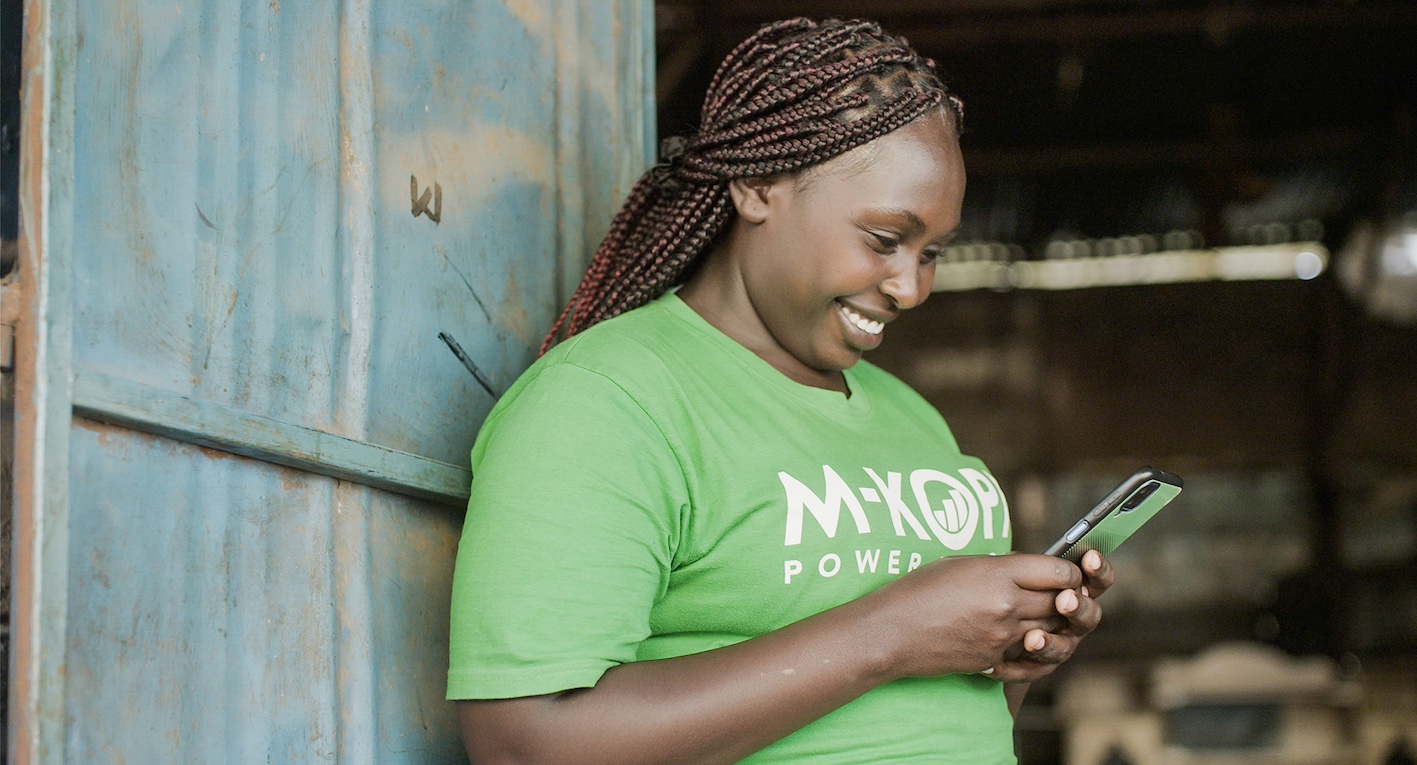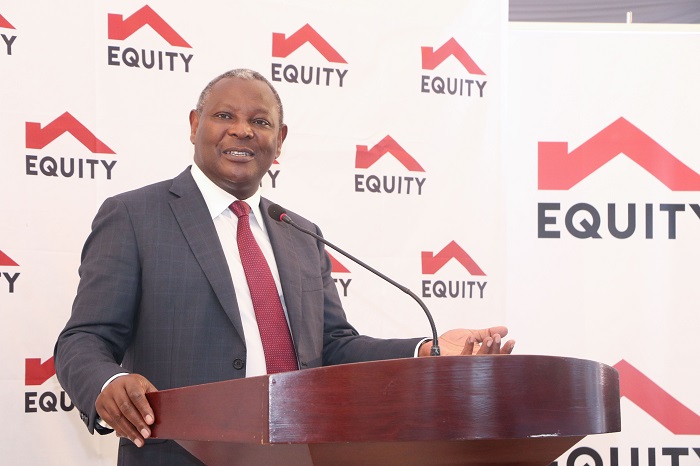Improving lives with AI and digital and financial inclusion in Kenya, one smartphone at a time

Jane Omondi sells freshly cooked fish from a stand on a bustling roadside in Utawala, a low- to medium-income neighbourhood about 16 kilometres, or 10 miles, east of central Nairobi.
Omondi grosses about 2,500 Kenyan shillings, or about $17, on her sales each day and takes home about 1,000 shillings after expenses. Her modest earnings are slightly above average for the majority of Kenyans.
In February 2023, Omondi was hospitalized when she went into labour and her third child was born prematurely. They were in the hospital for three weeks. For many Kenyans, this would be a disaster because of the medical expenses and lost income.
But Omondi had hospitalization insurance that helped cover her medical expenses and was able to recuperate lost income with a low-interest loan. She holds the key to that safety net in the palm of her hand – it’s her smartphone.
Through a company called M-KOPA, she bought the phone with a microloan, which she paid off in 90 days through the company’s app on the phone. The phone became the collateral against which she could obtain insurance and further loans. She pays 75 shillings a day, or about 50 cents, to service the loans. “M-KOPA has made a big difference in my life,” she says.
Today, more than 3 million customers in Africa who might not have been able to get credit from a bank have obtained products and loans through M-KOPA, a fintech company that serves the financially excluded. While the idea is simple, advances in AI and machine learning on Azure have improved the business model for M-KOPA. The use of AI has helped M-KOPA achieve significant increases in customer repayment performance – particularly for the follow-on products and services that M-KOPA offers to customers once they have successfully repaid their initial loan, according to Owen Scott, the chief technology officer of M-KOPA.
“Tracking the health of our lending portfolio is an absolute bedrock competency of the organization,” says Scott. “We use machine learning models to forecast the repayment of every single loan in our portfolio – every single day. And that gives us very early signals on any changes in repayment patterns, which in turn helps us strike an important balance between inclusive pricing, financial responsibility and, ultimately, customer protection.”
With the entire operation running in the Azure cloud, Scott says, “we’re very deeply embedded in the entire Microsoft ecosystem.” In addition to Microsoft AI and machine learning, the company uses Azure Cognitive Services, Azure Kubernetes and Azure Cosmos DB.
Supporting ‘financial resilience’
Founded in 2011 in Kenya, M-KOPA has expanded into Uganda, Nigeria and Ghana and is currently beginning operations in South Africa. By 2022, it had deployed more than $1 billion in credit with a focus on providing solutions that give people access to the digital world and help them financially in a way that is affordable and sustainable.
Nancy Sangoro, director of customer experience and retail at M-KOPA says, “Our mission is to make financing for everyday essentials affordable to everyone.”
That financing gives M-KOPA customers access to essential products they need to improve their lives, she says.
“When I think about the challenges that a lot of customers face, I can group them into two. One is financial resilience … Most customers are incapable of dealing with unforeseen emergencies. Through our upgrade products like health insurance, these customers can deal with unforeseen emergencies.”
She says that M-KOPA has issued about 204,000 customers with health insurance policies.
“The second challenge relates to access to credit,” she says. “Eighty-two percent of our customers have reported that by being able to access credit, they’ve been able to expand their businesses and grow their income by investing the excess funds in essentials like food, rent and education, which essentially improves their quality of life.”
Nicholas Njama, 44, a taxi driver in Nairobi, learned about M-KOPA at a critical moment in the fall of 2022. His smartphone had broken, and he couldn’t afford to buy a new one. “I rely on my smartphone because many of my clients are in India and they need to be able to reach me for when they are here,” he says. “I was losing business.”
“A friend told me about M-KOPA and I applied for a phone,” he says. The company requires an initial deposit, typically about 20% of the cost of the phone. “I couldn’t have gotten a loan from a regular bank, and the payments were small enough.”
Once he paid it off, he had a credit line, and he took out loans to pay off school fees for his two children. One loan was 9,000 shillings, and the payback is 75 shillings a day (around 50 cents). The interest charges amount to about 2,000 shillings, according to an M-KOPA spokesperson.
“M-KOPA helped me because I was weighed down with school fees and I was carrying a balance,” he says. “I have one kid in high school and the other one in the second year of university.”
Njama, like many M-KOPA clients, stays with the company because it has become a trusted source of help to get ahead.
M-KOPA has been growing rapidly. And while part of M-KOPA’s mission is to help foster entrepreneurship, it also creates thousands of jobs. In Kenya alone, it has over 12,400 sales representatives and employees, many of whom are sales reps whose pay is based on commission for finding new clients.
Empowering women
Sangoro of M-KOPA says that female customers are more likely than their male counterparts to increase their spending on education and health. She says they are also more likely to report an improvement in their quality of life because they tend to save more and use earnings to support their families. Because of these trends, Sangoro says, M-KOPA is offering new opportunities to increase women’s financial access.
“One out of three of our customers are women, and two in five of our sales agents are also women,” she says.
Ruth Njuguna, 27, is one of those sales agents. She sells phones where she lives, in the low-income community of Kawangware, about 15 kilometres, or 9 miles, west of Nairobi’s business center.
Unemployment there is high and daily income averages less than 300 shillings, or about $2, daily.
After losing her smartphone more than a year ago, a friend told her about M-KOPA. “Being able to get a good quality smartphone and having access to it at such a low price appealed to me,” she says. The low payments made it more attractive than settling for what she could afford at a regular smartphone store.
She later joined M-KOPA as a direct sales representative, selling M-KOPA smartphones in her community and earning a commission in return. The customers who buy an M-KOPA smartphone and make timely payments on it get access to cash loans. She says her clients have included ride-share app drivers and people running businesses through social media apps who need smartphones to operate.
“I like my job and I like seeing how my clients’ lives improve,” she says.
Jane Omondi, the fish vendor, was holding her youngest son, Tehila Wesonga. He is healthy, she says, and she’s grateful for the support M-KOPA provided. As soon as she’s paid off her current loan, she’s planning on taking out another one with an eye on expansion.
“I’ve been able to grow my business,” she says, “and I’m even hoping that by next year I will have another stand for selling fish in another location.”
This article was submitted by Chris Welsch
Follow us on Telegram, Twitter, and Facebook, or subscribe to our weekly newsletter to ensure you don’t miss out on any future updates. Send tips to editor@techtrendske.co.ke



